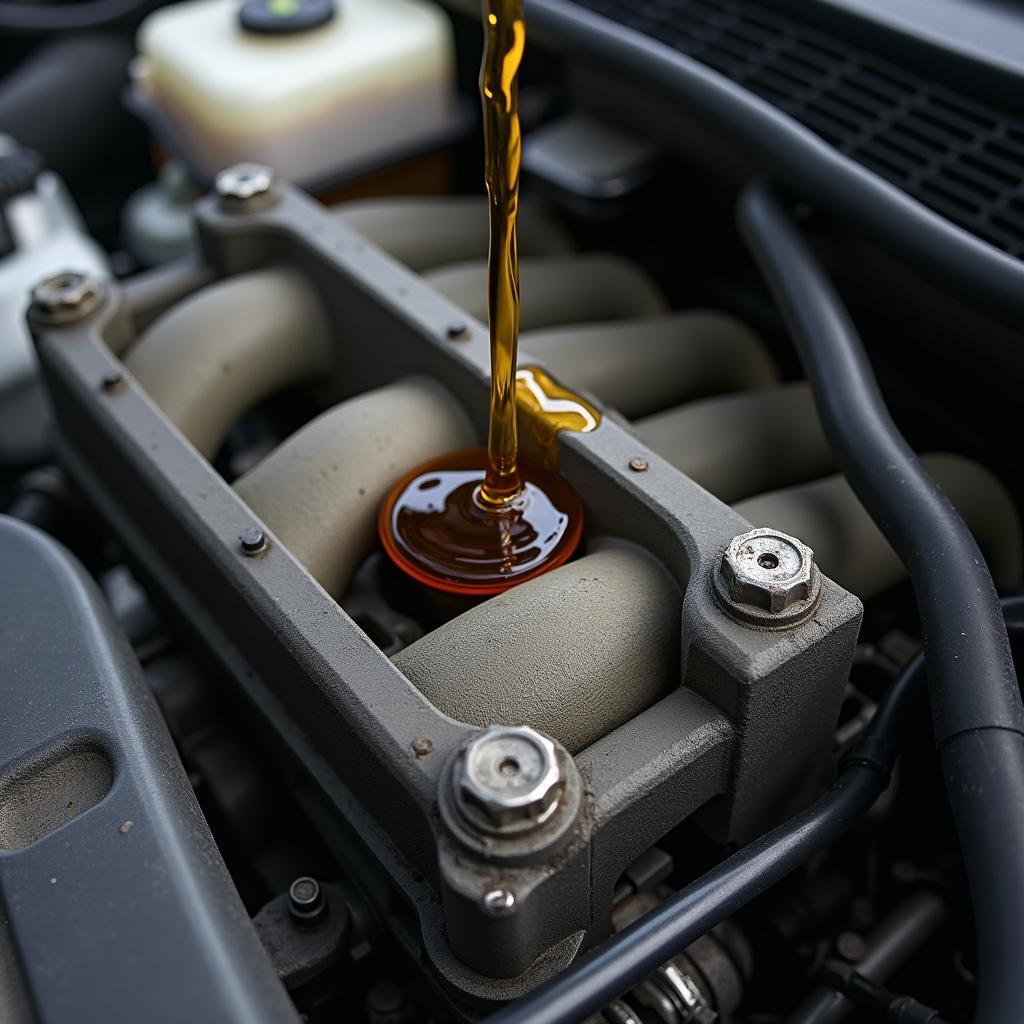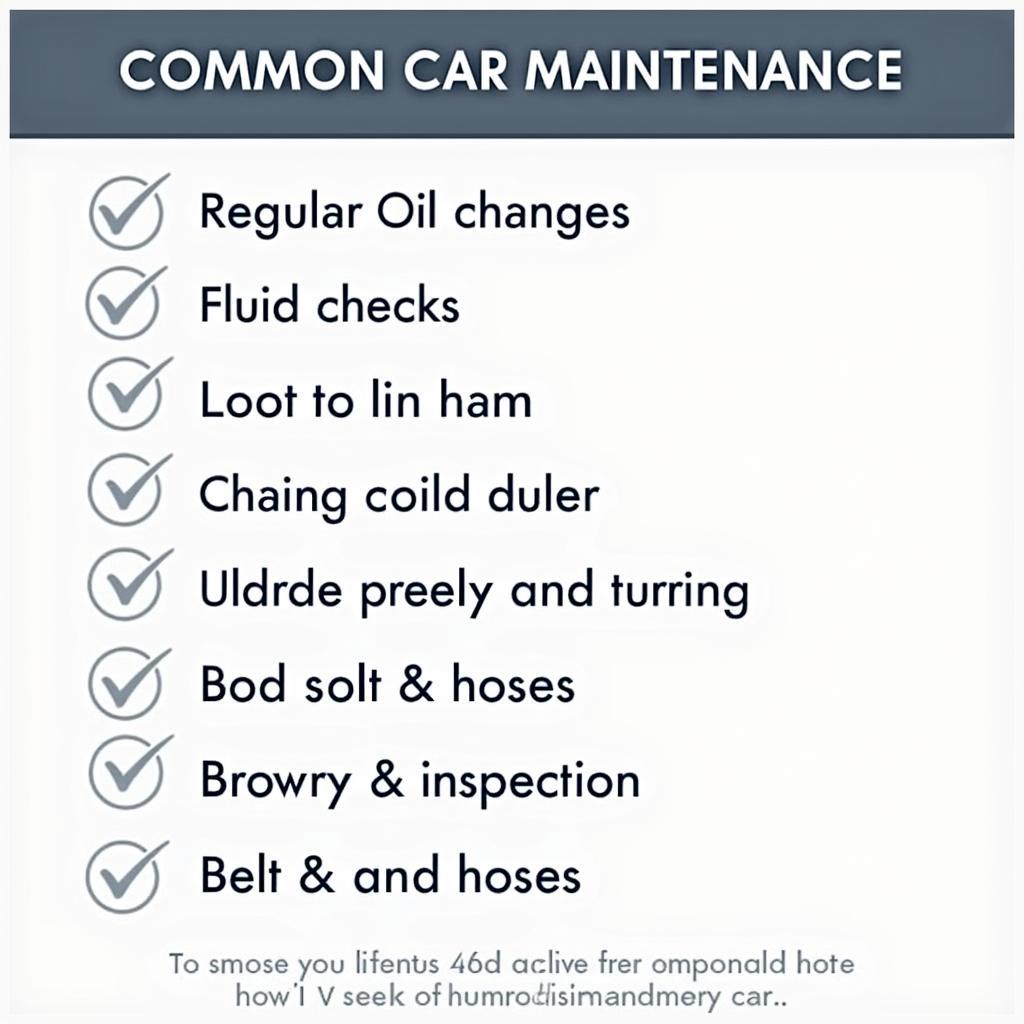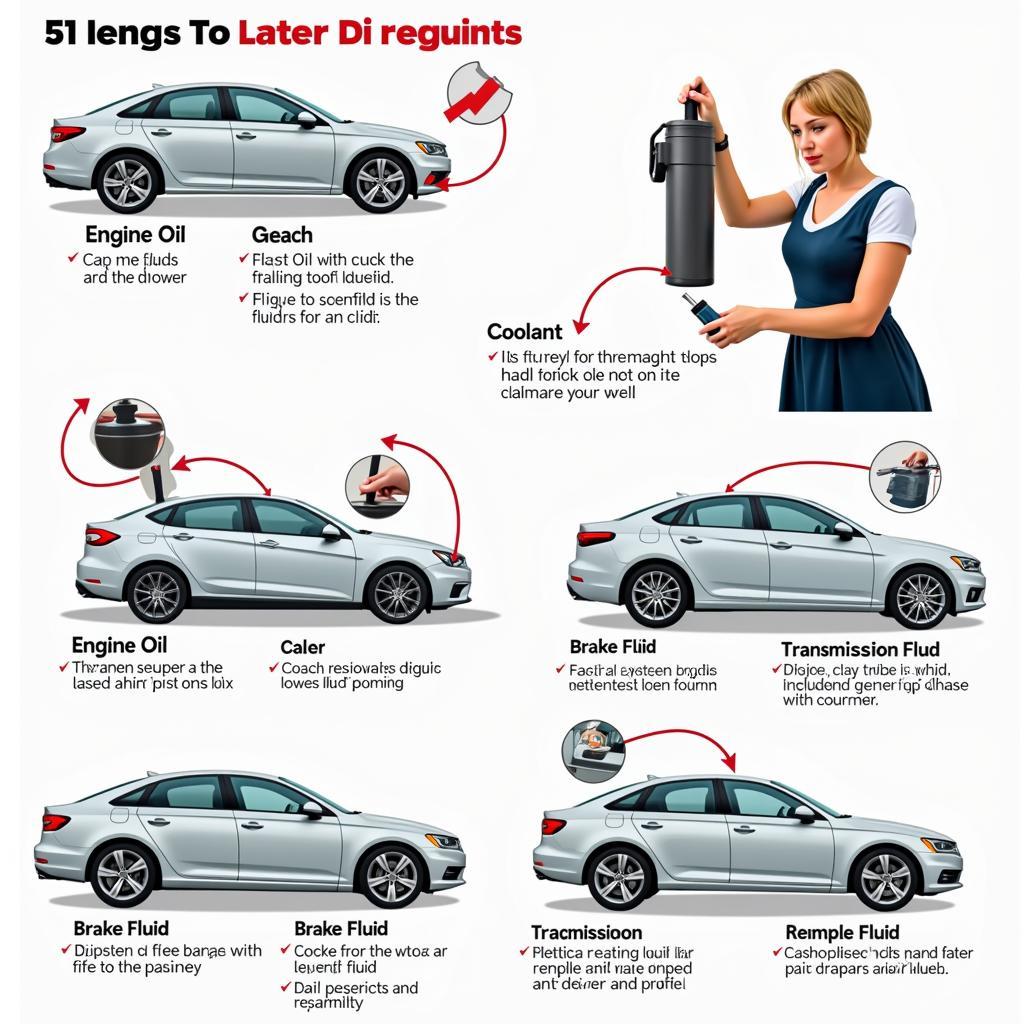High-mileage cars can be a great way to save money, but they also come with a higher risk of needing repairs. As a car owner, it’s essential to be aware of the common problems that can occur in high-mileage vehicles so you can be prepared to address them. This guide covers the most frequent issues you might encounter, offering insights and advice for prevention and maintenance.
Engine Problems
As a car’s engine accumulates miles, various components start to wear down, leading to potential problems. Here are some common engine issues in high-mileage cars:
Oil Leaks
 Engine Oil Leak
Engine Oil Leak
One of the most frequent problems is oil leaks. This occurs due to the aging of engine seals and gaskets. These components can become brittle and crack over time, allowing oil to escape.
“Oil leaks are a common problem in high-mileage vehicles,” says John Smith, an experienced automotive technician. “Regular inspections and maintenance can help prevent leaks by catching them early and addressing them before they become significant.”
Worn Piston Rings
Piston rings help seal the combustion chamber, preventing oil from entering the cylinders. Over time, these rings can wear down, causing oil to leak into the combustion chamber. This results in excessive oil consumption and can even lead to engine damage.
Valve Stem Seals
Valve stem seals are small rubber components that prevent oil from leaking past the valve stems. As these seals age, they can harden and crack, allowing oil to seep into the combustion chamber. This leads to blue smoke from the exhaust and oil consumption.
Transmission Problems
The transmission, responsible for transferring power from the engine to the wheels, can also experience issues with age and mileage.
Transmission Fluid Leaks
Like the engine, transmission seals can wear down over time, causing transmission fluid to leak. Transmission fluid is essential for proper gear shifting and lubrication. Losing transmission fluid can result in poor shifting, slipping, or even transmission failure.
Worn Clutches
Vehicles with manual transmissions have a clutch that engages and disengages the transmission from the engine. Over time, the clutch plates can wear down, resulting in slipping, difficulty shifting, or a burning smell.
Transmission Slipping
This is a symptom of various transmission issues, including low transmission fluid, worn clutches, or a faulty transmission valve body. Slipping occurs when the transmission doesn’t engage smoothly, causing the vehicle to hesitate or lose power.
Suspension and Steering Problems
The suspension and steering systems play a critical role in maintaining vehicle stability and handling.
Worn Shock Absorbers
Shock absorbers are responsible for absorbing bumps and dips in the road, providing a smooth ride. Over time, shock absorbers can wear out, leading to a bumpy ride, reduced handling, and excessive tire wear.
Worn Ball Joints
Ball joints connect the suspension arms to the wheels, allowing the wheels to move up and down and side to side. Worn ball joints can cause clunking noises, excessive play in the steering, and poor handling.
Power Steering Problems
Power steering assists in turning the wheels, making it easier to steer. Leaks in the power steering fluid lines or a faulty power steering pump can result in reduced power assistance and steering difficulty.
Electrical Problems
As electrical components age, they can become faulty, leading to various electrical problems.
Battery Problems
Batteries lose their capacity over time, becoming weaker and less able to start the engine. A weak battery can cause the engine to crank slowly or fail to start altogether.
Alternator Problems
The alternator charges the battery and provides power to the electrical system. A failing alternator can cause the battery to drain, leading to dimming lights, electrical problems, and eventually, a dead battery.
Electrical Wiring Problems
Over time, electrical wiring can become frayed, corroded, or damaged. This can cause short circuits, intermittent electrical problems, or even fire hazards.
Brake Problems
Brakes are essential for safe driving and stopping. Worn brake components can lead to reduced braking efficiency, causing the vehicle to stop more slowly and require more pedal pressure.
Worn Brake Pads and Rotors
Brake pads wear down with use, and eventually, need replacement. Worn brake pads can cause squeaking, grinding, or vibration noises while braking. Worn brake rotors can also cause brake vibration and reduced braking efficiency.
Brake Fluid Leaks
Brake fluid is essential for proper brake operation. Leaks in the brake lines or master cylinder can cause the brakes to feel spongy or fail altogether.
Other Common Problems
Cooling System Problems
The cooling system keeps the engine at the correct operating temperature. Leaks in the radiator, hoses, or thermostat can cause the engine to overheat, leading to severe engine damage.
Exhaust System Problems
The exhaust system directs exhaust gases away from the engine. Leaks in the exhaust system can cause noise, reduce engine performance, and emit harmful gases.
Fuel System Problems
The fuel system delivers fuel to the engine. Leaks in the fuel lines or a failing fuel pump can cause difficulty starting the engine, reduced fuel efficiency, or even a fuel fire.
How to Prevent and Address These Issues
While some problems are inevitable with high mileage, regular maintenance can help prevent and address them early on.
Here are some tips:
- Regular Oil Changes: Follow the manufacturer’s recommended oil change intervals.
- Inspect Fluids: Regularly check the levels and condition of all fluids, including engine oil, transmission fluid, brake fluid, power steering fluid, and coolant.
- Check Belts and Hoses: Inspect belts and hoses for signs of wear, cracking, or leaks.
- Perform Scheduled Maintenance: Adhere to the manufacturer’s recommended maintenance schedule, which includes items like spark plug replacements, air filter changes, and tire rotations.
- Listen for Unusual Sounds: Pay attention to any unusual noises your car makes, such as grinding, rattling, or knocking sounds, as they can indicate a problem.
- Address Small Issues Quickly: Don’t ignore minor problems. Address them promptly to prevent them from becoming more severe and costly.
 Car Maintenance Checklist
Car Maintenance Checklist
“Maintaining a car’s regular maintenance schedule is key to keeping it running smoothly and preventing costly repairs down the line,” says Mary Johnson, a seasoned auto mechanic. “By staying proactive, you can extend your car’s life and enjoy a trouble-free driving experience.”
Conclusion
While high-mileage vehicles can present challenges, understanding common issues and practicing preventive maintenance can significantly mitigate the risks. By staying vigilant and addressing potential problems promptly, you can enjoy the benefits of owning a high-mileage car without encountering unexpected surprises.
If you have any concerns about your high-mileage vehicle, feel free to contact Autotippro for expert advice and assistance.
AutoTipPro
+1 (641) 206-8880
500 N St Mary’s St, San Antonio, TX 78205, United States
FAQ
Q: What are the signs of a worn engine?
A: Some signs include excessive oil consumption, blue smoke from the exhaust, engine knocking or rattling, and a loss of power.
Q: How often should I change the transmission fluid?
A: Consult your owner’s manual for specific recommendations, but typically, transmission fluid should be changed every 30,000 to 60,000 miles.
Q: What are the symptoms of worn shock absorbers?
A: A bouncy ride, excessive body roll in corners, and a noisy suspension are common indicators of worn shock absorbers.
Q: What is the life expectancy of a car battery?
A: Car batteries typically last 3-5 years, but factors like driving habits and climate can affect their lifespan.
Q: What is the best way to prevent electrical problems in a high-mileage car?
A: Regular inspections, checking for loose or damaged wiring, and maintaining battery health are crucial steps in preventing electrical issues.





Leave a Reply